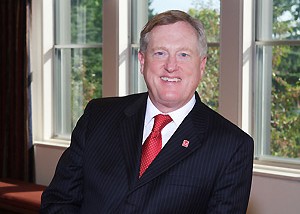With The Chancellor Leaving, Let's Talk About North Dakota's Problematic University Presidents

Scoring their second victory over a chancellor of the North Dakota University System in less than a decade, the state’s university presidents have to be feeling pretty full of themselves. Yet, even as Chancellor Hamid Shirvani departs (golden parachute planted squarely on his back), the problems in the state’s university system remains.
And those problems can be tied directly to the quality of leadership at the universities themselves. Or, more accurately, lack thereof.
It was clear to anyone paying attention that the problem with Chancellor Hamid Shirvani, his supposedly overbearing manner and ham-handed approach to leadership, had more to do with the egos he was tasked with managing than anything else. Especially those at the state’s three largest universities.
UND President Robert Kelley picked a fight with Shirvani over a proposed chancellor’s office on his campus. NDSU President Dean Bresciani was caught in publicly disclosed emails gloating to his colleagues about Chancellor Shirvani’s struggles and plotting to undermine his leadership. Minot State University President David Fuller, too, simply wouldn’t take instruction from the chancellor.
Per the emails below, obtained by way of an open records request, President Fuller doesn’t even really seem to have believed that Shirvani was his boss.
In the exchange, Fuller is objecting to Chancellor Shirvani granting Dr. John Girard, a Minot State professor, the “right to retreat” to his former position at MSU after he was hired to work for Shirvani at the university office. Shirvani explains in the emails that Girard was granted that right so that he could try out the new position at the university office while still being able to slide back into his old position in Minot if it didn’t work out.
That seems reasonable enough, but President Fuller retaliated with a hostile email to Chancellor Shirvani and then a full-on, multi-page email rant to the State Board of Higher Education accusing Shirvani of “disturbing and unprecedented” actions that were a “infringement upon institutional rights.”
I’ve long argued that the state’s university presidents see their campuses as little fiefdoms under their control and no other, and in Fuller’s emails we see that attitude on full display. To say that Fuller’s territorialism is unprofessional would be an understatement.
But Fuller’s unprofessional behavior doesn’t end there. In another email sent to his fellow university Presidents on March 7th of this year he complains about posts from this blog critical of issues such as graduation rates being included in a media package sent to the university presidents. He calls SAB an “illegitimate” website, and myself a “strange” person.
“To think that those were distributed by our own system, a system that should be working on our behalf and advocating for us,” Fuller writes indignantly.
I suspect President Fuller formed his opinion of me back when I was shining some light on the ridiculously expensive geothermal project he was pushing at his campus which as of 2011 was millions of dollars over budget.
I suspect my criticisms of higher education were included in the media packets because nobody else in the state covers those issues. In fact, it’s just been in the last few months that the state’s newspaper editorial boards have been willing to admit that there might be a problem in universities graduating just roughly 1/5th of admitted freshman (roughly 1/3rd at the state’s two-year schools) on time for their degrees. I’m sure my posts were distributed because the criticism therein was valid and pertinent.
But Fuller seems to think the attitude of the university system should be to dismiss such criticism, and ignore it. Which has always worked well in the past. The past before bloggers, and a university system chancellor who was interested in talking about those problems.
Regardless, Fuller’s exchanges with the Board of Higher Education and with Chancellor Shirvani illustrate the toxic environment that exists within the university system.
The voters will have a chance to reform the chancellor’s position and the board of higher education, replacing it with something new, in November 2014. But in addition to new leadership structure, we just need a better quality of leader than what we have at the universities now.







